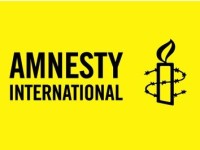
This week, as the Olympic medal counts came in, Russian president Vladimir Putin was once again called out by Nadezhda "Nadya" Tolokonnikova and Maria "Masha" Alekhina, former Amnesty International prisoners of conscience and members of feminist punk collective Pussy Riot. In a New York Times op-ed, a 'music video,' and in live tweets about being beaten and detained in Russia, Nadya and Masha skewered Putin for punishing with prison sentences citizens who publicly disagreed with him.
Since the women first burst onto the international spotlight after their 2012 "punk prayer" in Moscow's Christ the Savior Cathedral, the story of Pussy Riot has been emblematic of a much larger crackdown on free expression in Russia. So what are we to make of Nadya and Masha's latest actions? Moreover, as the Sochi Olympics come to a close, what is in store for the struggle for freedom and rights in Putin's Russia?
In the absence of sustained international attention, the future looks bleak for human rights in Russia. On Friday, Moscow's Zamoskvoretskii Court handed down a guilty verdict to eight of the protestors arrested in connection with a May 6, 2012 protest. These eight people -- Artiom Saviolov, Stepan Zimin, Denis Lutskevich, Aleksey Polikhovich, Sergei Krivov, Yaroslav Belousov, Aleksandra Dukhanina and Andrey Barabanov -- were among tens of thousands of protestors who gathered for an anti-Putin rally on Moscow's Bolotnaya Square on the eve of Vladimir Putin's inauguration ceremony, which turned violent when police began to block the protestors' path into the square. (A ninth Bolotnaya Square protestor, Mikhail Kosenko, was already sentenced to forcible psychiatric treatment last year; an ominous return to a Soviet-era method of silencing critical voices.)
Now these eight Russian citizens -- students, opposition activists, even a former marine -- have been put through a show trial to amplify a message to Russian society: "Dissent will not be tolerated in Putin's Russia." On Monday, they will hear the sentence that goes along with the guilty verdicts; it could be up to six years behind bars.
Such obvious criminalization of freedom of assembly and expression might seem to contradict President Vladimir Putin's recent, sweeping prisoner amnesty and pardon of high profile Prisoner of Conscience Mikhail Khodorkovsky, which led some to wonder whether he had begun to embrace increased respect for free expression and other human rights in the lead-up to the 2014 Sochi Olympics.
In reality, the Russian authorities have continued to intimidate and harass human rights defenders on the very doorstep of the Olympic village. Environmental activist Yevgeny Vitishko has been sent to serve a three year sentence in a penal colony for protesting the destruction of protected forests near the Sochi Olympic site. Nadya and Masha of Pussy Riot reported being arrested three times in as many days in Sochi early last week. Cossack militiamen attacked and whipped the two women and other activists in Sochi as they donned balaclavas in preparation for a guerilla performance at an outdoor square.
Now Nadya and Masha are using their notoriety to even more explicitly tie their stories to the injustices perpetrated against activists like Vitishko and the Bolotnaya Square protestors. When the two women joined Amnesty onstage at Barclay's Center in New York in early February, they used the spotlight to direct the audience's attention to the Bolotnaya defendants, reading verbatim the powerful final statements the Bolotnaya detainees made before the Moscow court. In a tone eerily reminiscent of Pussy Riot's testimony during their trial, Aleksandra Dukhanina declared "My conscience will be clean. Those who stay out of prison will live in an eternal cage remembering their illegal and unlawful acts. You can choke, imprison ... Violence and lies will never help you achieve anything."
It is likely no accident that the Bolotnaya defendants will be sentenced the day after the Olympic closing ceremonies when the international spotlight turns from Sochi and the Olympic village empties. Like the constant harassment and intimidation of Nadya, Masha, and other activists, the conviction of Vitishko and the Bolotnaya detainees has been seen as a warning to all who would dare to raise their voices in protest -- a harbinger of an even more brutal crackdown to come. As Masha Alekhina wrote in her New York Times op-ed, "This story is bigger than the Olympic venues, bigger even than the Olympics. This is a story about the real Russia of today. It exists, and the price of its existence is prison sentences for innocent people who speak out."
It is our job, as an international community of human rights activists, to speak out when the presence of international media is no longer protecting activists and Russian journalists.
This post is part of a series produced by The Huffington Post and Amnesty International USA in the theme of "Bringing Human Rights Home." Read all posts in the series here. Visit here to learn more about Amnesty International USA's work to abolish the death penalty. Follow Amnesty International USA on Facebook and @amnesty.
